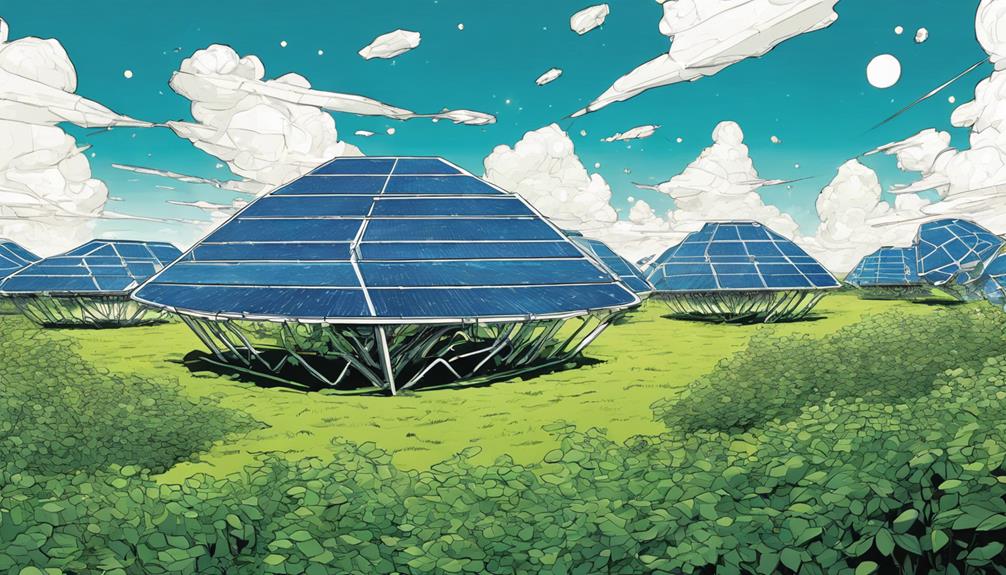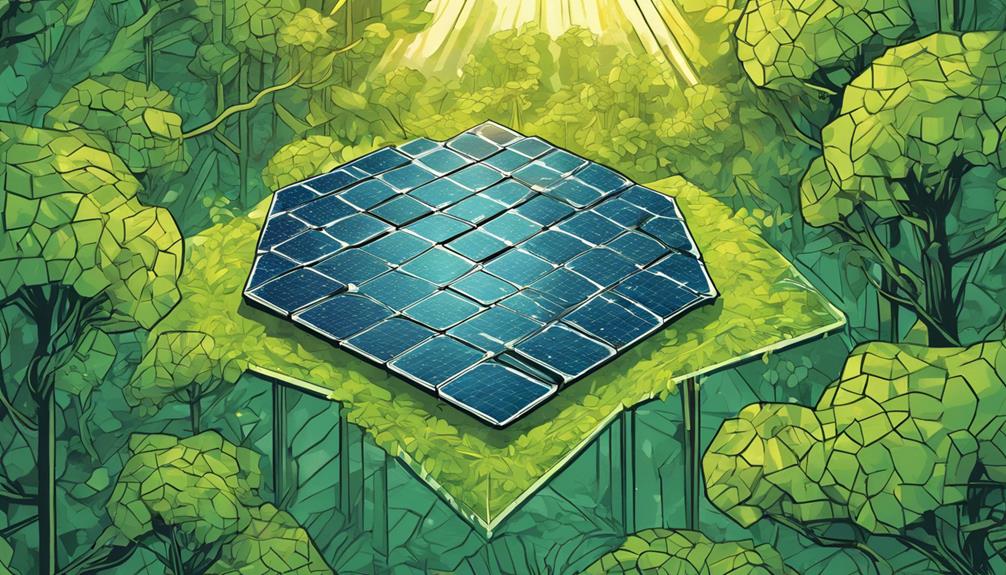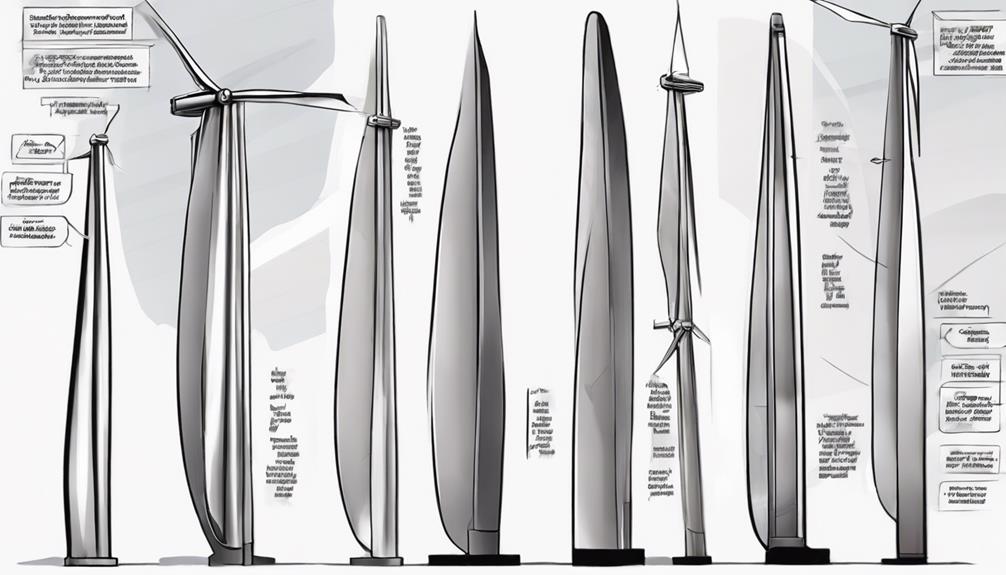As I explore the world of renewable energy, I'm enthusiastic to discover how modular solar panel solutions are revolutionizing the game. By harnessing the full potential of solar power, these innovative solutions enable individuals and communities to access clean energy more efficiently and effectively. From enhancing panel efficiency to empowering sustainable education practices, the possibilities are vast. I'm excited to dive deeper into the world of modular solar panels and uncover the secrets to accessing a greener future.
Key Takeaways
- Modular solar panel solutions enhance efficiency by optimizing panel design, reducing energy losses, and increasing energy output.
- Innovative technologies like bifacial panels and tracking systems boost energy conversion rates and reduce costs.
- Modular designs enable flexible and scalable solar energy systems, suitable for various applications and environments.
- Integration of energy storage systems and smart grids enables efficient energy distribution and consumption.
- Modular innovation in solar energy accelerates the transition to a low-carbon economy and combats climate change.
Modular Solar Panel Solutions

TEXT:
Here is an example of a paragraph that needs better structure. Each sentence should be on its own line to improve readability. This will help the reader to understand the text more easily. By breaking up the paragraph into separate lines, the main ideas can be clearly seen. This technique is often used in writing to make the text more organized and coherent.
Harnessing Renewable Energy Potential

I'm utilizing innovative technologies to unlock the full potential of renewable energy sources, especially solar power, to create a sustainable future.
As I explore further into the world of solar energy, I'm excited to investigate the vast possibilities it offers.
By incorporating solar energy into our daily lives, we can combat climate change, reduce air pollution, and promote a clean, reliable, and sustainable source of power.
It's essential to educate students about sustainable practices, involving them in green initiatives, and empowering them to make positive changes.
Empowering Sustainable Education Practices

By integrating solar energy education into the curriculum, I'm fostering a deeper understanding of sustainability among students, ultimately empowering them to become environmentally conscious leaders of tomorrow. This approach not only enhances student engagement but also instills a sense of responsibility towards the environment.
Through hands-on experiences and interactive workshops, students gain practical knowledge of solar energy systems, making them more likely to adopt sustainable practices in their daily lives. By promoting renewable energy awareness, I'm inspiring a new generation to take action against climate change and air pollution.
Collaborative Green Initiatives Unite

As I work to empower sustainable education practices, I'm also building partnerships with local environmental groups and community organizations to drive collaborative green initiatives that unite schools and communities in promoting environmental stewardship.
By joining forces, we can amplify our impact and create a ripple effect of positive change. Together, we're developing projects that educate students and community members about renewable energy, sustainable practices, and environmental conservation.
These collaborative efforts not only foster a sense of community but also provide opportunities for hands-on learning, skill-building, and real-world application.
Optimizing Solar Panel Efficiency

Here is the output:
Enhancing Solar Panel Effectiveness
I'm examining the factors that affect the efficiency of solar panels, from sunlight availability to panel placement, to maximize their potential and generate clean energy. It's essential to calculate energy consumption, analyze sunlight duration, and determine the optimal number of solar panels. By doing so, we can optimize panel efficiency and reduce environmental impact.
| Factor | Influence on Efficiency | Optimization Strategy |
|---|---|---|
| Sunlight Availability | Direct impact on energy output | Optimize panel placement and angle |
| Panel Efficiency | Affects energy conversion rate | Choose high-efficiency panels |
| Cost Considerations | Influences system size and design | Balance cost with energy needs |
| Government Incentives | Encourages adoption and investment | Research and leverage available incentives |
| System Maintenance | Impacts long-term performance | Regular cleaning and inspection schedule
Frequently Asked Questions
What Is the Typical Lifespan of a Solar Panel System?
"I'm often asked about the typical lifespan of a solar panel system, and I can confidently say it's around 25-30 years, with some lasting up to 40 years, depending on quality and maintenance."
Can Solar Panels Be Used to Power Electric Vehicles?
As I connect to the future, I discover that solar panels can indeed power electric vehicles, enabling a sustainable synergy between renewable energy and eco-friendly transportation, paving the way for a cleaner, greener tomorrow.
How Does Weather Affect Solar Panel Performance?
'I've learned that weather conditions greatly impact solar panel performance. Rain, snow, and excessive heat reduce energy output, while clear skies and moderate temperatures optimize energy generation.'
Are There Any Government Incentives for Residential Solar Installations?
"Did you know the US Trenton Solar Farm generates enough energy to power 1,500 homes? Yes, there are government incentives for residential solar installations, like the Solar Investment Tax Credit (ITC), offering up to 26% of total costs!"
Can Solar Panels Be Installed on Old or Historic Buildings?
Yeah, I've seen it done – solar panels can be installed on old or historic buildings, but it requires careful planning and creative solutions to preserve the building's integrity and architectural charm.
How Does Modular Innovation Revolutionize Solar Energy in Comparison to Unleashed Solar Cells?
Modular innovation is revolutionizing solar energy cells by allowing for easier installation, maintenance, and scalability. Unlike traditional unleashed solar cells, modular systems can be easily expanded or upgraded to accommodate changing energy needs. This flexibility makes them a more practical and efficient choice for both residential and commercial solar energy solutions.
Conclusion
As I wrap up my journey into the world of solar energy, I'm struck by the transformative power of modular innovation.
Did you know that if just 1% of the world's desert areas were covered in solar panels, we could generate enough energy to power the entire planet? It's astounding to think about the potential.
With modular solar panel solutions, we're one step closer to making that vision a reality.
The future of energy is bright, and it's powered by the sun.










